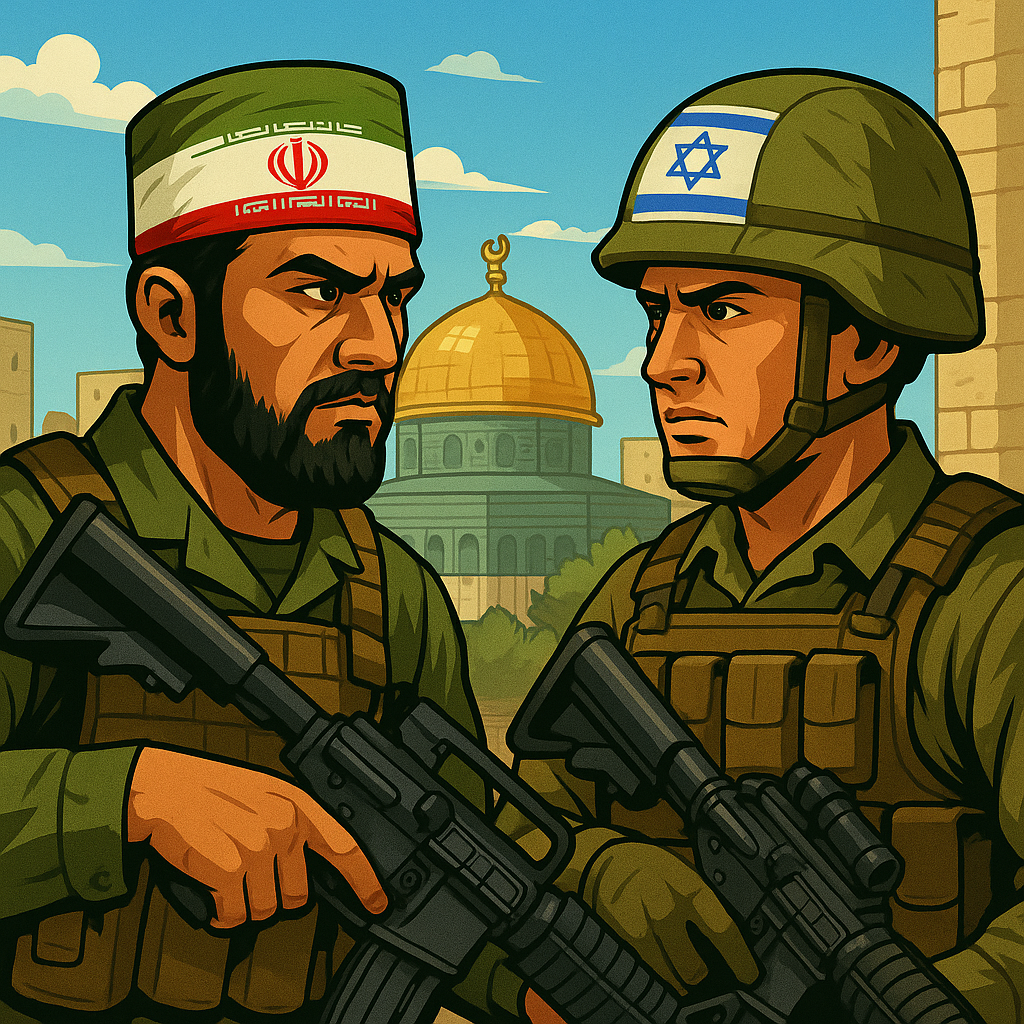From the Smoke Pit - Israel vs Iran

The conflict between Israel and Iran has been a persistent source of tension in the Middle East, rooted in decades of ideological, geopolitical, and military rivalry. As of June 16, 2025, the situation has escalated dramatically, with both nations engaging in direct military confrontations, including missile strikes and targeted attacks. Today's issue explores the historical context, recent developments, and the broader implications of this volatile conflict, drawing on the latest available information.
📜 History
The hostility between Israel and Iran traces back to the 1979 Iranian Revolution, which transformed Iran into an Islamic Republic under Ayatollah Khomeini. Prior to this, the two nations maintained relatively amicable relations, with Israel viewing Iran as a strategic ally against common Arab adversaries. However, the revolution introduced a theocratic regime in Iran that viewed Israel as an illegitimate state, fueling ideological opposition.
Over the decades, Iran has supported proxy groups such as Hezbollah in Lebanon and Hamas in Gaza, which have engaged in repeated conflicts with Israel. Iran’s pursuit of nuclear capabilities has further heightened tensions, with Israel perceiving a nuclear-armed Iran as an existential threat. The 2015 Joint Comprehensive Plan of Action (JCPOA), or Iran nuclear deal, temporarily eased concerns, but its collapse in 2018 under the Trump administration reignited fears of Iran’s nuclear ambitions.
The “shadow war” between the two nations has included cyberattacks, assassinations of Iranian nuclear scientists, and Israeli airstrikes on Iranian-linked targets in Syria. This covert conflict has now spilled into open warfare, marking a dangerous new chapter.
Looking to advertise your business? Look no further! This ad sponsored block can be all yours!
📈 Recent Developments
As of June 16, 2025, the Israel-Iran conflict has entered its fourth day of direct military engagement, characterized by intense missile exchanges and targeted strikes. Here are the key developments based on recent reports:
- Israeli Strikes on Iran: Israel has launched attacks on significant Iranian targets, including the Defense Ministry, nuclear facilities, and the headquarters of the Quds Force, a branch of Iran’s Islamic Revolutionary Guard Corps (IRGC). Israel claims these strikes target military infrastructure, asserting they avoid civilian casualties. However, Iran’s health ministry reports 224 deaths, with over 90% being civilians, and 1,277 hospitalizations since the attacks began on June 13, 2025. Notable strikes include an attack on Farabi Hospital in Kermanshah province and Iran’s state television in Tehran, which Iran condemns as deliberate targeting of civilian infrastructure.
- Iranian Retaliation: Iran has responded with hundreds of ballistic missiles aimed at Israeli cities, including Tel Aviv, Jerusalem, and Haifa. These attacks have caused significant damage, including to Israel’s electricity grid and an oil refinery in Haifa. Iranian strikes have killed at least 18 people in Israel since June 13, 2025. Iran’s Foreign Minister Abbas Araghchi has stated that Iran will continue its responses unless Israel halts its “military aggression,” emphasizing Iran’s willingness to fight but openness to diplomacy if prompted by U.S. intervention.
- Espionage and Intelligence: Iran claims to have obtained a significant cache of Israeli intelligence, including nuclear secrets, through its Ministry of Intelligence and Security (MOIS). This operation reportedly involved recruiting Israeli citizens, marking a significant breach of Israeli security. Conversely, Iran executed Esmail Fekri for spying for Israel’s Mossad, highlighting the ongoing intelligence war.
- International Reactions: The conflict has drawn global attention. U.S. President Donald Trump has indicated that Iran may be open to de-escalation talks, though he has also expressed concerns about Israel’s strikes potentially destabilizing the region. The European Union is convening an emergency meeting of its foreign ministers, and Turkish President Recep Tayyip Erdogan has discussed the conflict with Trump.
- Economic Impact: The conflict has disrupted global oil markets, with prices soaring due to fears of supply disruptions through the Strait of Hormuz, a critical oil chokepoint.
The escalation follows years of provocations, including Israel’s alleged bombing of Iranian targets in Damascus in April 2024, which prompted Iran to prepare retaliatory strikes. The current conflict is the deadliest direct confrontation between the two nations in decades, with no immediate signs of de-escalation.
🌐 Broader Implications
The ongoing conflict has far-reaching consequences for the Middle East and beyond:
- Regional Stability: The direct nature of the attacks risks drawing in other regional players, such as Hezbollah, Syria, or even Gulf states, potentially broadening the conflict. The targeting of nuclear facilities raises fears of radioactive fallout or further escalation if Iran accelerates its nuclear program.
- Global Diplomacy: The U.S. plays a pivotal role, with Iran suggesting that a single call from Washington could halt Israeli aggression. However, the Trump administration’s cautious approach reflects a desire to avoid a wider war, especially given domestic and international pressures.
- Humanitarian Crisis: The high civilian toll in Iran and the displacement in Israel underscore the humanitarian cost. Long lines for fuel in Iran and damaged infrastructure in Israel highlight the economic strain on both populations.
- Nuclear Concerns: Israel’s strikes on nuclear facilities could either delay Iran’s nuclear ambitions or provoke Tehran to double down, potentially leading to a more aggressive pursuit of nuclear weapons.
🤔 My Take
Israel faces an extraordinarily complex and dangerous situation, but its actions are grounded in a fundamental need for self-defense. Iran’s long-standing support for terrorist organizations like Hezbollah and Hamas, coupled with its nuclear ambitions, poses a clear and present danger to Israel’s existence. The strikes on Iranian military and nuclear targets, while controversial, aim to neutralize threats that could otherwise lead to catastrophic consequences for Israel and the region. Iran’s missile barrages on Israeli cities, which have killed civilians and damaged infrastructure, demonstrate a reckless disregard for human life, undermining their claims of targeting only military sites.
While the loss of civilian lives in Iran is tragic, Israel’s precision strikes contrast with Iran’s indiscriminate missile attacks. The international community must recognize Israel’s right to protect its citizens from a regime that openly calls for its destruction. Diplomacy remains a viable path, but it must be backed by strength to ensure Iran’s aggression is curtailed. The U.S. and other global powers should support Israel’s defensive measures while pushing for a resolution that prevents further escalation.
🗒️ Final Notes
The Israel-Iran conflict is a multifaceted crisis with no easy solutions. Both nations are locked in a cycle of retaliation, driven by deep-seated mistrust and strategic imperatives. While Israel’s actions are framed as defensive, the high civilian toll in Iran fuels accusations of disproportionate force. Iran’s missile attacks, meanwhile, escalate the conflict and risk broader regional instability. The international community, particularly the U.S., holds the key to de-escalation, but any diplomatic efforts must address the core issues of Iran’s nuclear program and its support for proxy warfare.
For now, the world watches anxiously as the Middle East teeters on the brink of a wider conflict. In the mean time, what do you think about the current situation?
Sources: NBC News, Al Jazeera, AP News, NY Times, CNN, and various Social Media Posts.
No links? - A news outlet covering the Department of Defense messaged me asking me to not link them anymore, stating that it raises suspicion of sponsorship. For this reason, I will cite the sources without including a hyperlink. I'm sorry.
👋 Follow Me!
If you enjoyed this content, please follow me on Social Media and consider sharing this content with your friends! I hope you have a great day tomorrow! - Karl Bullock "That Smoke Pit Veteran"

